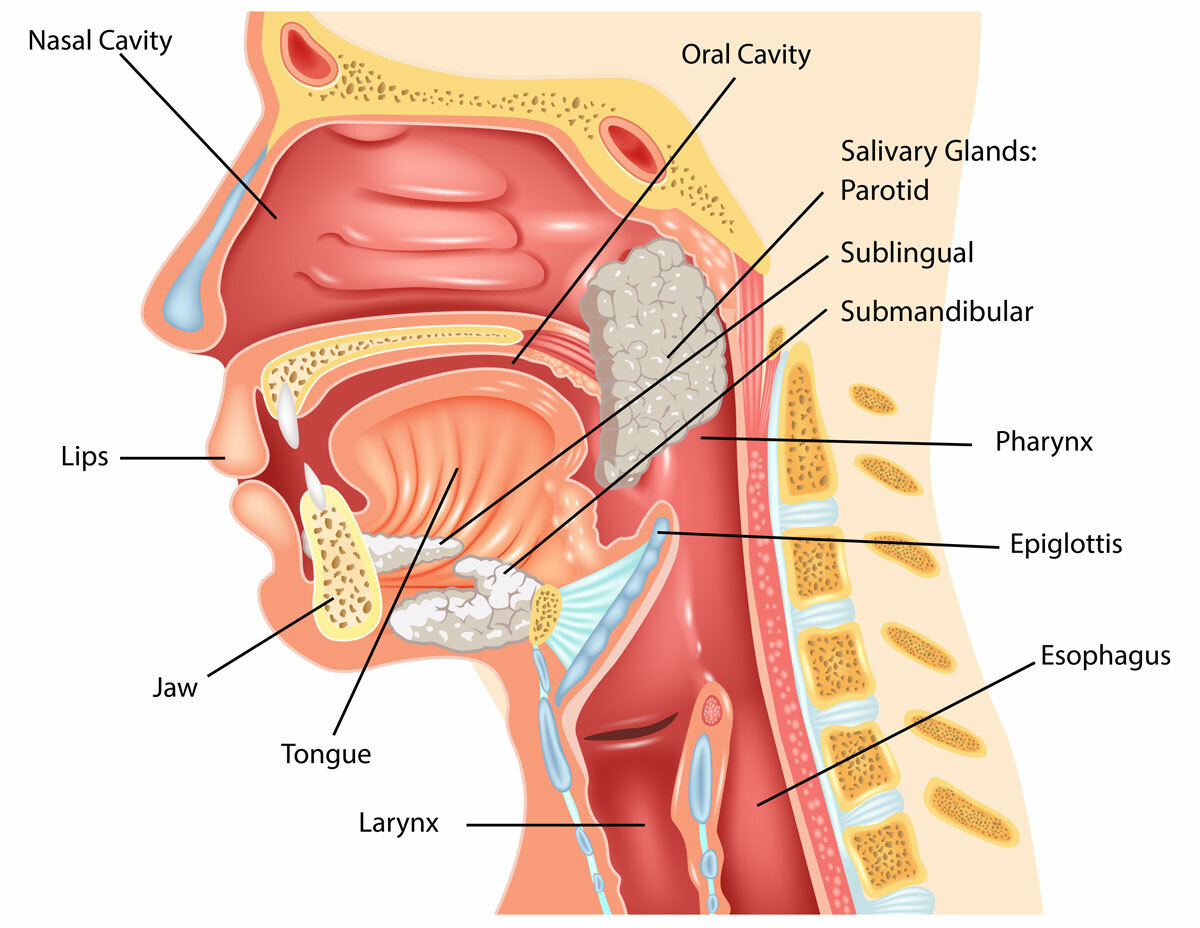November 1, 2022
What You Should Know About Head and Neck Cancers

Head and neck cancer is a general term referring to several different types of cancer that originate in this region of the body. It can include one or more body parts, including:
Hypopharynx
Throat
Sinus cavities
Lips and oral cavity
The inside of the nose
Salivary glands

There are a few things known to increase the likelihood of developing a head or neck cancer, such as smoking tobacco, heavy alcohol use, or an infection of the human papillomavirus (HPV).
It’s important to know what the head and neck cancer signs are so that you know what to do if you, your dentist, or your doctor notices something out of the ordinary.
What Does Head or Neck Cancer Look and Feel Like?
Simply put, it could appear in a lot of different ways because symptoms vary according to their location in the body. But there are some things that you should look out for, especially if you’re in a higher-risk category and you don’t have another known reason for the symptom.
Talk to a doctor or your dentist if you notice:
Swelling of the jaw
Lumps or sores inside the nose, throat, or mouth that don’t heal or go away
Frequently blocked sinuses or sinus infections that aren’t caused by another condition
Voice changes or hoarseness that isn’t related to a virus or other temporary condition
Discoloration, such as a brown spot or a white spot in the mouth, on the tongue, or on your gums
Weight loss that you can’t explain
Frequent headaches that start to show up without another reason
Depression or exhaustion that doesn’t get better with rest
While some of these symptoms of head and neck cancer can be related to other non-cancerous conditions, be sure you have a medical professional evaluate anything out of the ordinary.
Symptoms of Head and Neck Cancer by Type
Nasal cavity cancers can cause chronic infections, blocked sinuses, nosebleeds, headaches, pain in the cheeks or around the teeth, and may cause ringing in the ears.
Oral cavity cancer, also called lip or oral cancer, affects the mouth and lips, causing noticeably different colored patches in your mouth or tongue and bleeding or discomfort.
Salivary glands produce saliva (spit) that helps break down foods and keep the mouth moist. Cancer in these glands often causes swelling, numbness, or pain in the facial area.
Throat/Pharynx cancers may cause difficulty breathing, discomfort while swallowing, neck or throat pain, earaches, and problems with hearing or speaking.
Voice Box/Larynx cancer affects the vocal cords and the epiglottis. The epiglottis is the flap of skin that hangs in the back of your throat. It closes whenever you swallow to keep food from entering your lungs. Symptoms of laryngeal cancer and hypopharyngeal cancer usually include changes in the voice, pain when swallowing, or ear discomfort.
If any of these symptoms last for two weeks or more, discuss them with your doctor.
How Do They Find Head & Neck Cancers?
While there is no established screening program to identify head and neck cancers, your healthcare providers can detect them during regular visits. At your annual health check-up, your primary-care doctor will examine your head and neck for anything abnormal. Your dentist will examine your mouth, lips, and throat for signs of head and neck cancers. Your feedback is very important to help identify potential cancers. If you have any discomfort, abnormal feelings in the head and neck area, sores, or lumps, be sure to discuss them with your doctor.
If your doctor or dentist notices an area that could be cancerous during an exam or they notice something unusual in an image, such as an MRI, they may recommend a biopsy to take samples of the cells. The results of the biopsy will make it clear if cancer cells were found, where they’re located and how fast they’re likely to grow.
If cancer is found, an oncologist is the type of doctor who will create your treatment plan. They’ll examine any images already taken and may want to run more tests or request additional images. An assessment may also be required to determine if the cancer has grown outside of the initial area where it started. All of these things are a part of deciding which treatments are needed and when.
What Does Head and Neck Cancer Treatment Include?
The specific recommendations for head and neck cancer treatments are based on the information gathered about the cancer. Oncologists, like the ones at Cancer Care Centers of Brevard, will also consider your age, overall health status, and treatment goals.
Most head and neck cancers are removed with surgery. Many patients also have radiation therapy after surgery to destroy any cancer cells that couldn’t be surgically removed. In some cases, radiation is also used before surgery to make the tumor smaller before it’s removed.
If the cancer has spread to lymph nodes or other organs, chemotherapy or another systemic treatment will be used to kill cancer cells that are moving throughout the body. Chemotherapy, immunotherapy, and targeted therapy for head and neck cancers are other methods of treatment that may be used, depending on the type of cancer and its stage.
Most patients will have multiple types of treatment to increase the chance that all the cancer cells are killed.
During cancer treatment, there may be several medical professionals on your treatment team, including:
A medical oncologist who oversees the cancer treatment plan and execution.
A radiation oncologist who oversees the radiation treatments that are included in the treatment plan.
A surgeon who removes the cancer and a margin of surrounding tissue.
Oncology nurses and radiation therapists who provide treatment and address concerns you might have with side effects or other challenges during treatment
Social workers who help with identifying additional resources such as community resources, support for your mental health, and assistance for your caregivers.
Dietitians who provide nutritional support and recommendations.
Speech therapists are included if cancer affects any areas involved with your speaking ability.
Head and Neck Cancer Doctors in Brevard County, Florida
With today’s modern technologies and treatments, there is a good prognosis for head and neck cancer patients when detected early. If you notice something, don’t wait! Schedule an appointment with your doctor who can do more testing.
If cancer is found, Cancer Care Centers of Brevard is here to help newly diagnosed patients with the best treatment options and follow-up care.
Our cancer treatment centers in Brevard County, Florida, are filled with dedicated cancer specialists who put patients and their loved ones first. If you or a loved one needs to see an oncologist for head or neck cancer, CCCB offers the latest treatments, including access to clinical research trials in Melbourne, Merritt Island, Palm Bay, and Sebastian, Florida. Find a location nearest you to request an appointment with our head and neck cancer specialists.
Categories: Head and Neck Cancers